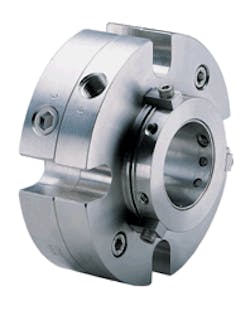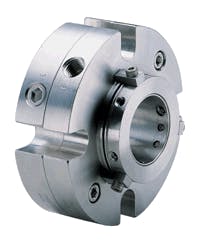Gas Seals Trim Maintenance Costs
A manufacturer of nylon intermediates, the DuPont Sabine River Works Site increased throughput and improved product quality at its Orange, Texas, plant with the installation of two gas seals and centrifugal pumps.
In one application, the plant had been using canned pumps, which required a lot of maintenance and adversely affected unit operation. In the three years since the new pumps and seals were installed, maintenance costs were trimmed by more than $47,000 dollars. Additional gas seals have been installed in other applications at the plant.
The canned pumps were used to pump the tails of a distillation column at 187 Degrees C to the next column in the process. The pumps originally were selected to prevent any air from entering the process and to eliminate any possibility of leakage. Unfortunately, the canned pumps could not handle the process upsets that would occur throughout the year. These upsets included pressure swings in the distillation column and clogging of the in-line suction screen, resulting in frequent canned pump overhauls.
The canned pump overhauls were performed outside the plant because of the specialized nature of the equipment. Unfortunately, the pump overhauls were both expensive and time consuming. As a result, spare canned pumps had to be stored on-site for installation in the unit, adding to the company's inventory and warehouse space.
DuPont investigated its sealing options with conventional centrifugal pumps, looking at single seals, dual seals and gas seals. Ultimately, the company opted for gas seals.
Gas seals would operate on plant nitrogen common in the unit. The gas seals would not fail in the absence of process fluid lubrication. Even if the pump ran dry, the gas seals would remain unaffected.
The 4400 model gas seal works well in both normal operation and process upsets at the plant.
Face flashing as a result of additional seal face frictional heat on the low-vapor-pressure fluid was no longer a concern. Nitrogen is inert and is not a process contaminant like oxygen and liquid barrier fluids. In addition, the installation costs for the gas seals were much lower than the dual seal alternatives. No cooling was necessary be-cause additional frictional heat from the seals was eliminated.
However, DuPont was concerned about the reliability of the new technology. Also, large amounts of nitrogen usage would reduce process quality. DuPont's primary focus was to identify a design that would maximize reliability and be relatively easy to use.
The company selected the Chesterton 4400 gas seal from A.W. Chesterton Co., Stoneham, Mass., in 1999. The 4400 model seals the process fluid on the outside diameter of the seal faces. It works well in both normal operation and process upsets at the plant.
Plant engineering and maintenance personnel liked the Chesterton seal because:
It minimizes gas consumption because of its ability to track process pressure and regulate differential pressure between nitrogen and process to 1.5 bar.
The in-gland control system (IGCS) eliminates the need for an expensive control panel. The IGCS is a smart seal within the gas seal that senses pressures and regulates gas or nitrogen to seal.
Sealing process fluid on the outside diameter allows the Chesterton 4400 seal to work more reliably in solids services than conventional back-to-back gas seals.
The Chesterton 4400 seal fits easily in a standard-size stuffing box even on small-frame pumps.
Each Chesterton 4440 seal and centrifugal pump cost only slightly more than one canned pump repair. The break-even point on the project for both pumps was less than nine months.

